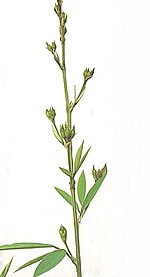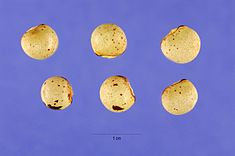Pigeon pea
| Pigeon pea | |
|---|---|
 |
|
| Scientific classification | |
| Kingdom: | Plantae |
| (unranked): | Angiosperms |
| (unranked): | Eudicots |
| (unranked): | Rosids |
| Order: | Fabales |
| Family: | Fabaceae |
| Genus: | Cajanus |
| Species: | C. cajan |
| Binomial name | |
|
Cajanus cajan (L.) Millsp. |
|

Pigeon peas in Trinidad and Tobago
|
|
| Nutritional value per 100 g (3.5 oz) | |
|---|---|
| Energy | 569 kJ (136 kcal) |
|
23.88 g
|
|
| Sugars | 3 g |
| Dietary fiber | 5.1 g |
|
1.64 g
|
|
|
7.2 g
|
|
| Vitamins | |
| Thiamine (B1) |
(35%)
0.4 mg |
| Riboflavin (B2) |
(14%)
0.17 mg |
| Niacin (B3) |
(15%)
2.2 mg |
| Pantothenic acid (B5) |
(14%)
0.68 mg |
| Vitamin B6 |
(5%)
0.068 mg |
| Folate (B9) |
(43%)
173 μg |
| Choline |
(9%)
45.8 mg |
| Vitamin C |
(47%)
39 mg |
| Vitamin E |
(3%)
0.39 mg |
| Vitamin K |
(23%)
24 μg |
| Minerals | |
| Calcium |
(4%)
42 mg |
| Iron |
(12%)
1.6 mg |
| Magnesium |
(19%)
68 mg |
| Manganese |
(27%)
0.574 mg |
| Phosphorus |
(18%)
127 mg |
| Potassium |
(12%)
552 mg |
| Sodium |
(0%)
5 mg |
| Zinc |
(11%)
1.04 mg |
|
Link to USDA Database entry
Values for Choline, Vit. E/K available |
|
|
|
| Percentages are roughly approximated using US recommendations for adults. Source: USDA Nutrient Database |
|

Seeds of the pigeon pea
|
|
| Nutritional value per 100 g (3.5 oz) | |
|---|---|
| Energy | 1,435 kJ (343 kcal) |
|
62.78 g
|
|
| Sugars | n/a |
| Dietary fiber | 15 g |
|
1.49 g
|
|
|
21.7 g
|
|
| Tryptophan | 212 mg |
| Threonine | 767 mg |
| Isoleucine | 785 mg |
| Leucine | 1549 mg |
| Lysine | 1521 mg |
| Methionine | 243 mg |
| Cystine | 250 mg |
| Phenylalanine | 1858 mg |
| Tyrosine | 538 mg |
| Valine | 937 mg |
| Arginine | 1299 mg |
| Histidine | 774 mg |
| Alanine | 972 mg |
| Aspartic acid | 2146 mg |
| Glutamic acid | 5031 mg |
| Glycine | 802 mg |
| Proline | 955 mg |
| Serine | 1028 mg |
| Hydroxyproline | 0 mg |
| Vitamins | |
| Thiamine (B1) |
(56%)
0.643 mg |
| Riboflavin (B2) |
(16%)
0.187 mg |
| Niacin (B3) |
(20%)
2.965 mg |
| Pantothenic acid (B5) |
(25%)
1.266 mg |
| Vitamin B6 |
(22%)
0.283 mg |
| Folate (B9) |
(114%)
456 μg |
| Choline |
(0%)
0.000000 mg |
| Vitamin C |
(0%)
0 mg |
| Vitamin E |
(0%)
0.000000 mg |
| Vitamin K |
(0%)
0.000000 μg |
| Minerals | |
| Calcium |
(13%)
130 mg |
| Iron |
(40%)
5.23 mg |
| Magnesium |
(52%)
183 mg |
| Manganese |
(85%)
1.791 mg |
| Phosphorus |
(52%)
367 mg |
| Potassium |
(30%)
1392 mg |
| Sodium |
(1%)
17 mg |
| Zinc |
(29%)
2.76 mg |
|
Link to USDA Database entry
Values for Choline, Vit. E/K unavailable |
|
|
|
| Percentages are roughly approximated using US recommendations for adults. Source: USDA Nutrient Database |
|
The pigeon pea (Cajanus cajan) is a perennial legume from the family Fabaceae. Since its domestication in India at least 3,500 years ago, its seeds have become a common food grain in Asia, Africa, and Latin America. It is consumed on a large scale mainly in south Asia and is a major source of protein for the population of that subcontinent.
The pigeon pea is known by numerous names with different etymologies, no-eye pea, tropical green pea, gungo pea in Jamaica, and gandule bean.
The cultivation of the pigeon pea goes back at least 3,500 years. The centre of origin is probably peninsular India, where the closest wild relatives (Cajanus cajanifolia) occur in tropical deciduous woodlands. Archaeological finds of pigeon pea dating to about 3400 years ago (14th century BC) have been found at Neolithic sites in Karnataka (Sanganakallu) and its border areas (Tuljapur Garhi in Maharashtra and Gopalpur in Orissa). From India it traveled to East Africa and West Africa. There, it was first encountered by Europeans, so it obtained the name Congo Pea. By means of the slave trade, it came to the American continent, probably in the 17th century.
Today, pigeon pea is widely cultivated in all tropical and semitropical regions of both the Old and the New Worlds. Pigeon peas can be of a perennial variety, in which the crop can last three to five years (although the seed yield drops considerably after the first two years), or an annual variety more suitable for seed production.
Pigeon pea is an important legume crop of rainfed agriculture in the semiarid tropics. The Indian subcontinent, eastern Africa and Central America, in that order, are the world's three main pigeon pea-producing regions. Pigeon peas are cultivated in more than 25 tropical and subtropical countries, either as a sole crop or intermixed with cereals, such as sorghum (Sorghum bicolor), pearl millet (Pennisetum glaucum), or maize (Zea mays), or with other legumes, such as peanuts (Arachis hypogaea). Being a legume capable of symbiosis with Rhizobia, the pigeon pea enriches soil through symbiotic nitrogen fixation.
...
Wikipedia
